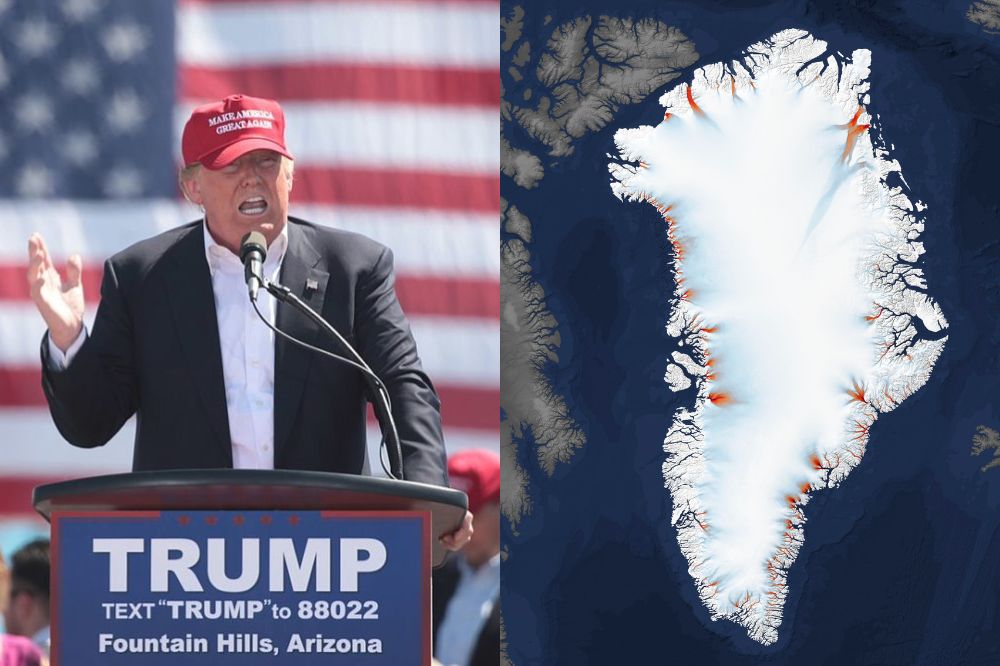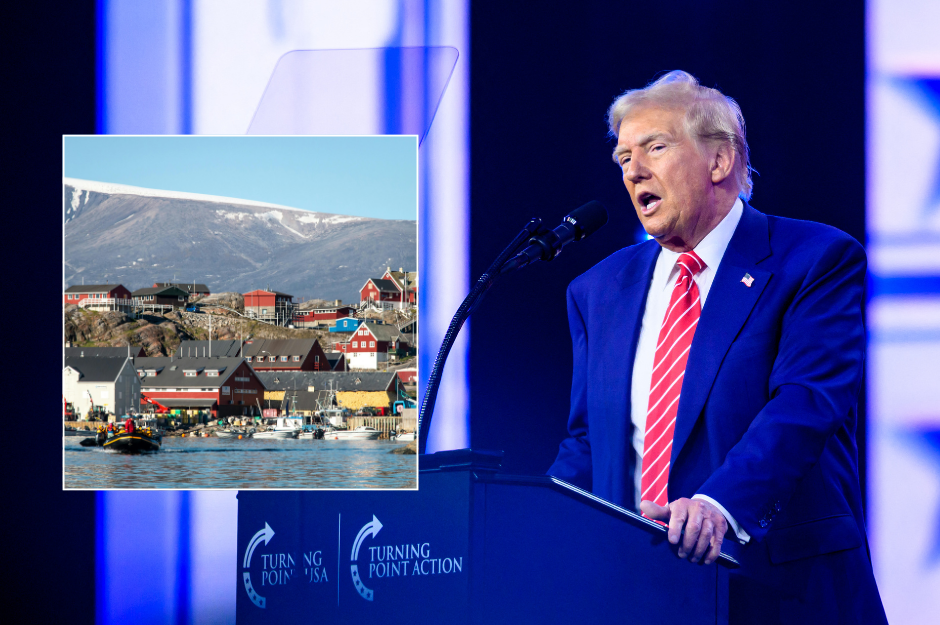Trump's Greenland Annexation: US Aims & Geopolitical Impact
Could the United States, in the not-so-distant future, claim Greenland as its own? Donald Trump, with characteristic conviction, has repeatedly expressed his belief that the annexation of Greenland is not only possible but also a strategically vital objective for the United States.
The prospect of the U.S. acquiring Greenland, the world's largest island and a self-governing territory within the Kingdom of Denmark, has ignited a firestorm of geopolitical debate. It's a scenario that combines elements of realpolitik, economic interest, and national security concerns, raising questions about international law, sovereignty, and the future of the Arctic. While dismissed by some as a whimsical notion, the former U.S. President's consistent interest in Greenland, coupled with his penchant for challenging established norms, demands serious consideration of the implications. The notion of the United States annexing Greenland, however, is not a novel one.
The roots of this fascination stretch back centuries, with Greenland's strategic location and vast natural resources always piquing the interest of global powers. The island's position in the Arctic, a region of increasing geopolitical significance due to climate change and the opening of new shipping routes, has made it a focal point for military and economic competition. The presence of significant mineral deposits, including rare earth elements crucial for modern technology, further adds to Greenland's allure. For the United States, the island offers a strategic advantage, providing a vital outpost for monitoring Russia's activities in the Arctic and bolstering its military presence in the region. This is not the first time the idea has come up. In 1867, the US considered purchasing Greenland from Denmark, an offer that was turned down. The United States offered Denmark $100 million for the island, which the Danish government refused. Again, in 1946, the US offered to buy Greenland for $100 million but was rejected again. In 1917, the US purchased the Virgin Islands from Denmark for $25 million, so it would not be the first time the US has purchased land from Denmark.
The potential for conflict and the disruption of the existing order are paramount. The very suggestion has been met with strong opposition from Greenland's government, which has made it abundantly clear that it has no desire to become part of the United States. Prime Minister Mte Bourup Egede has been outspoken in his assertion that Greenland will remain independent and that its people will not become American citizens. Egede's stance underscores the fundamental importance of respecting self-determination and the principle of non-interference in the internal affairs of sovereign nations. Denmark, too, has made its position clear, firmly rejecting any notion of ceding control of Greenland to the United States. While the legal right of Denmark to hold Greenland is clear, the historical context is complex. Greenland has its own parliament, the Inatsisartut, and has gradually gained more autonomy from Denmark, with Greenland responsible for almost all areas except defense, foreign affairs, and justice. The United States and Denmark are NATO allies, however the two nations have had some disagreements.
However, the political will to see this vision come to fruition remains a subject of intense debate, given the potential for international condemnation. The odds are stacked against such a move, but Trump's consistent interest keeps the possibility alive, albeit in the realm of speculation.
| Aspect | Details |
|---|---|
| Country | Greenland |
| Area | 2,166,086 square kilometers (836,330 sq mi) |
| Population | 56,483 (2023 est.) |
| Capital and Largest City | Nuuk |
| Government | Parliamentary democracy within the Kingdom of Denmark |
| Official Language | Greenlandic (Kalaallisut) and Danish |
| Currency | Danish Krone (DKK) |
| Major Industries | Fishing, tourism, mining (potential) |
| Strategic Importance | Arctic location, access to resources (minerals), strategic military positioning |
| Current Status | Self-governing territory within the Kingdom of Denmark |
When questioned about his vision for the potential annexation, Trump's response, "Yeah, well, I think itll happen," highlighted his unwavering belief in the feasibility of the project. This bold assertion, while seemingly offhand, reflects his broader philosophy of decisive action and a willingness to challenge established norms in pursuit of his goals. Moreover, his statements during a meeting with NATO Secretary General Mark Rutte in the Oval Office, where he confidently stated his belief that the United States would annex Greenland, further solidified the issue as a central focus.
However, the logistical and legal hurdles are significant. Annexation would require overcoming considerable resistance from Greenland's population, navigating complex international laws, and weathering the inevitable diplomatic backlash from Denmark and other nations. Any such move would undoubtedly be met with strong condemnation from the international community, raising questions about the legality and legitimacy of the U.S.'s actions. The potential for strained relations with key allies, particularly Denmark, a fellow NATO member, would be considerable. The current Prime Minister of Greenland, Mte B. Egede, has been particularly vocal in his opposition, asserting that Greenland will remain independent. Despite Denmarks refusal, Trump remains confident that the U.S. will annex Greenland.
Some observers suggest that a disinformation campaign could be launched to sway public opinion in Greenland. Nance predicts that Trumps administration, potentially with the support of allies, could launch a disinformation campaign to sway public opinion in Greenland. The goal would be to foster internal divisions and create a pretext for U.S. intervention, ultimately giving Trump access to Greenlands mineral wealth. The idea is that the people of Greenland would welcome U.S. intervention, but the odds are stacked against this idea.
The former Presidents focus on Greenland is not simply a matter of personal whimsy. He has repeatedly emphasized the strategic importance of the island, citing its location as a crucial asset for national security. The island's location, in the Arctic, is strategically important, as the Arctic region becomes increasingly vital due to climate change and the opening of new shipping routes. In his view, control of Greenland is an "absolute necessity" for ensuring U.S. national security, especially as a check on Russia's military activities in the Arctic region, as well as accessing Greenland's rich mineral resources. His confidence is rooted in his belief that political will can be bent to match his vision. Military brass have scoped Greenlands bases as a check on Russias northern moves, a factor Trump touts heavily.
The economic arguments, while not always explicitly stated, are also significant. Greenland is rich in natural resources, including minerals and rare earth elements, that are essential for modern technologies. Control over these resources would offer the U.S. a significant economic advantage, reducing its dependence on foreign suppliers and bolstering its industrial base. Trump's interest in Greenland is also linked to its potential as a tourist destination and its untapped economic potential. This economic incentive complements the strategic interest, creating a compelling case for U.S. involvement. Trump said that the control of Greenland was an absolute necessity for ensuring U.S. national security.
While the odds are stacked against a successful annexation, the persistence of Trump's interest keeps the issue alive. His focus on Greenland is also linked to his broader foreign policy objectives. His America First approach has often emphasized strengthening U.S. power and influence. The potential annexation of Greenland would be the first U.S. land gain in over a century. Securing Greenland would represent a major geopolitical victory, solidifying American dominance in the Arctic and signaling to the world that the U.S. is prepared to act decisively to protect its interests. As such, the possibility of annexation is not just a fanciful notion but a tangible expression of the former president's vision for a more assertive and powerful United States.
One of the underlying factors in Trump's interest in Greenland is a desire to project American strength on the global stage. Greenland is currently considered by many to be an area of great strategic importance. The United States has its eye on the island to further cement its position in the Arctic. In a bid to counter Russias presence in the Arctic, the U.S. military has also scoped out Greenlands bases. The idea is that if the U.S. has control of Greenland, it can better deter Russia. The U.S. military is also interested in the strategic importance of Greenlands location.
The former Presidents comments suggest that he might want NATO involved in his attempt to take over the island. The day before polls opened in Greenland, Trump said he could make the island's 57,000 residents rich if they decided to link up with the U.S. Trump's strategy for annexation is less clear, but he suggested that economic coercion might be used, as in his reported suggestion to make Canada the 51st state of the United States. While the United States has made overtures for purchasing Greenland from Denmark in the past, the islands population has no interest in being part of the U.S. The U.S. president called their win a good thing for the U.S. after he vowed last week that America will take control of the Arctic island one way or another.
The United States has a long history of involvement in Greenland, dating back to World War II when the U.S. established military bases on the island to counter the threat of Nazi Germany. The U.S. continued to maintain a presence in Greenland during the Cold War, using the island as a strategic outpost for monitoring Soviet activities in the Arctic. The U.S. military maintains a significant presence on Greenland to this day, with the Thule Air Base serving as a critical component of the U.S. early warning system. The strategic importance of Greenland has become even more pronounced in recent years due to increasing military competition in the Arctic. The U.S. has also invested heavily in Greenland's economy, providing financial assistance and technical expertise to help the island develop its infrastructure and resources. The U.S. has a close relationship with Denmark, which is responsible for Greenland's defense and foreign affairs. While the two countries have a strong alliance, the U.S.'s interest in Greenland has occasionally caused friction, particularly over the issue of sovereignty.
Despite the potential obstacles, the prospect of Greenland's annexation continues to spark conversation on geopolitical implications, raising questions about international law, sovereignty, and the future of the Arctic. Whether it remains a bold dream or the potential subject of an unexpected move remains to be seen.
It is also worth noting that the possibility of the U.S. annexing Greenland, which would be the first U.S. land gain in over a century, has garnered significant media attention. The media has engaged in serious discussions about the feasibility and legality of annexation, as well as its potential benefits and drawbacks.

Trump refuses to rule out military force to take over Greenland and

Denmark says it will continue Arctic cooperation with US after Trump

Dem seeks to halt Trump from 'invading' Greenland, Canada and Panama